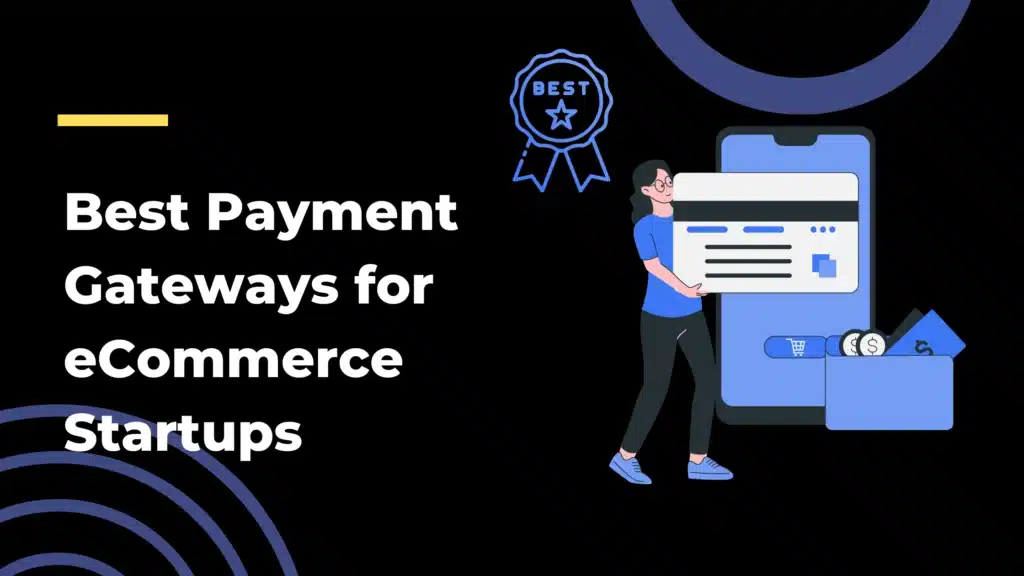Best Payment Gateways for eCommerce Startups: Payment gateways are crucial tools for entrepreneurs looking to build trust, guarantee safe transactions, and offer a flawless client experience as the eCommerce industry changes. It is crucial to pick the correct payment gateway, particularly for startups trying to strike a balance between cost and features. We will examine some of the top payment gateways for startups in this post, going over their features, advantages, and how they cater to the particular requirements of eCommerce companies in 2024. This thorough guide will assist you in making an informed decision that fits your business objectives, clientele, and budget.

Table of Contents
ToggleTop Payment Gateways for Startups
There are many different payment gateways available, so knowing what each one offers can help you choose the ideal one for your startup. We will start with some of the more popular and startup-friendly solutions, outlining key features, fees, and compatibility for each.
1. PayPal for Startups
Why use PayPal? Startups often choose PayPal since it is one of the most well-known and reliable payment gateways. PayPal, which is well-known for being user-friendly, provides a recognizable interface to both consumers and sellers, simplifying transactions and lowering possible obstacles to purchase. PayPal also offers several services that small businesses find appealing, such as integrated fraud protection and streamlined international transactions.
Features and Benefits:
- Global Reach: PayPal is perfect for entrepreneurs looking to reach a global audience because of its extensive availability, which spans more than 200 countries.
- Simple Onboarding Process: Companies can begin taking payments right away with a simple onboarding procedure.
- Buyer Protection: PayPal’s buyer protection feature can give new customers who are buying with your company an additional degree of confidence.
Payment Structure: For domestic transactions, PayPal normally charges 2.9% + $0.30 per transaction. An extra 1.5% fee is applied to international payments, which can mount up for companies looking to expand internationally. But for businesses in their early stages, PayPal’s security features and well-known brand frequently make the price point worthwhile.
Cons: PayPal has certain drawbacks despite being user-friendly. International transaction fees can be somewhat expensive, and account freezes or holds do happen from time to time.
Integration: PayPal is a flexible option for entrepreneurs because of its seamless integration with platforms such as WooCommerce, Shopify, and Magento.
Ideal for: Startups hoping to reach a large, global clientele or companies who value usability over personalization.
Additional Reading: Learn more about WooCommerce and PayPal integration on our Webpluse blog.
2. Stripe: Flexible Payment Solutions for Growing eCommerce Businesses
Why use Stripe? Stripe is well-known for its developer-friendly API and provides unmatched customization and flexibility, making it ideal for tech-savvy startups or expanding companies. Stripe supports a range of payment methods, including digital wallets and credit cards, and enables companies to take payments in numerous currencies.
Features and Benefits:
- Customisable: Companies can design a unique payment experience with Stripe’s powerful API.
- Accepts a Variety of Payment Methods: Stripe takes several payment methods, such as ACH transfers, Apple Pay, Google Pay, and cards.
- Advanced Analytics: Offers comprehensive reporting, which is advantageous for companies seeking a data-driven understanding of their client interactions.
Fee Schedule: Like PayPal, Stripe charges a competitive base rate of 2.9% + $0.30 for each transaction. Stripe is somewhat more cost-effective for international transactions because it additionally charges a 1% currency translation fee.
Cons: Without technical assistance, Stripe can be difficult to set up, thus not all firms will find it suitable. However, scalable startups should give the platform some thought due to its customizable features.
Integration: Stripe may be modified to work with custom-built websites and connect well with WooCommerce, Shopify, and other eCommerce systems.
Ideal for: Technically savvy startups seeking a scalable solution with a wide range of customization choices.
Further Reading: If you’re interested in WordPress integrations, check out our guide on building a scalable eCommerce website.
3. Square: Affordable and Easy for Small Businesses
Why use Square? For new businesses looking for a simple, affordable payment option, Square is a fantastic option. Square was first well-known for its in-person payment options, but it is now ideal for omnichannel businesses because it provides online payment options as well as an intuitive interface.
Characteristics and Advantages
- No Monthly Fees: Startups keeping a careful eye on their finances are drawn to Square’s straightforward pricing structure, which has no hidden costs.
- Omnichannel Support: Businesses that have both physical and digital stores would benefit greatly from omnichannel support, which enables them to take payments both in-person and online.
- Dashboard User-Friendly: Square’s dashboard offers clear analytics and is easy to use.
Fee Structure: Square is often less expensive than PayPal and Stripe due to its flat fee structure of 2.6% + $0.10 per transaction. These savings can mount up for companies handling large volumes.
Cons: Square is not as good for firms with a global emphasis because of its limited international reach.
Integration: Square is most appropriate for U.S.-based firms, but it integrates easily with platforms like WooCommerce and BigCommerce.
Ideal for: Small companies in need of a user-friendly solution that provides free monthly payment alternatives for both online and in-person transactions.
Internal Resource: For more eCommerce solutions, visit our guide on essential tools for online business.
Additional Gateways to Explore
- Authorize.Net: This payment gateway provides sophisticated fraud detection and safe, expandable choices for security-focused startups.
- Shopify Payments: Ideal for companies who only use Shopify, these payments have no costs associated with in-platform sales.
- Amazon Pay: Customers can use their Amazon account to make purchases with this option, which capitalizes on Amazon’s reputation.
- Braintree: Another adaptable choice from PayPal is Braintree, which supports several currencies and a range of payment options.
- 2Checkout (Verifone): Verifone’s 2Checkout is renowned for its global presence and support for numerous languages and currencies.
Why Payment Gateways Matter for eCommerce Startups
Putting up an eCommerce website entails creating a platform that makes buyers feel secure and encouraged to make purchases. From preventing fraud to encrypting payment information, a payment gateway manages the intricate and technical aspects of online transactions while guaranteeing seamless communication between banks and e-commerce platforms. Payment gateways streamline this procedure so that companies can concentrate on developing new products and cultivating clientele.
The top payment gateways for eCommerce firms should have the following essential features:
- Security: PCI compliance, fraud detection, and Secure Socket Layer (SSL) encryption are crucial.
- Ease of Integration: Well-known eCommerce systems like WooCommerce and Shopify require a gateway that integrates easily for startups.
- Cost-Efficiency: Minimal monthly expenses, no hidden fees, and reduced transaction fees.
- Customer assistance: Good customer assistance is essential since technological problems can arise, particularly while scaling.
Conclusion: Best Payment Gateways for eCommerce Startups
For eCommerce firms hoping to increase client confidence and ensure secure transactions, selecting the appropriate payment gateway is essential. You can choose the gateway that works best for your startup by taking into account your target market, transaction fees, and business demands. Each gateway has special benefits for startups, whether you go with the well-known and reliable PayPal, the adaptable Stripe, or the reasonably priced Square.



